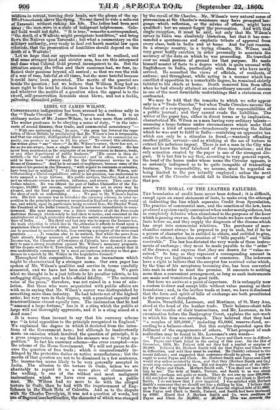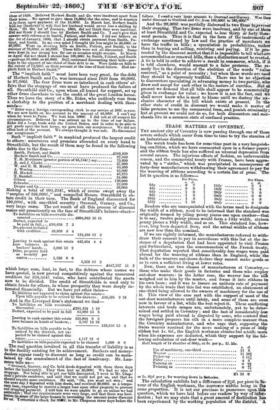THE MORAL OF THE LEATHER FAILURES.
Tins boundaries of credit have never been defined ; it is tliffieult, except upon an exact statement of-faets, to make ever; the• attempt at indicating the line which separates Credit from Speculation. The practice of commercialmen, and thesanction of the law, have produced. a system vastly couvenientwhen un der moral guidance, but as completely delusive when abandoned to thopurposes of the hour which is passing, over us. In-the leather trade,we have-now the exact facts before us, and they supply the diagnosis of the disease-which has crept into commercial relations. The purchaser of mer- chandise cannot .always be prepared to pay in cash, but if helm a person of character he--is entitled to obtain, and entitled to give, credit to others ; hence the creation of " bills payable " and " bills receivable." The law hasdicta.ted the-very words of these instru- ments of exchange ; they must be made payable to the " order " of the drawer, and express that ;theyare drawn for " valuere- ceived." So long as they represent a corresponding remount in value they are legitimate vouchers of commerce. The indorsers have a right to believe that the acceptor has received valuewhich, by the time of his acceptance becoming due, las been converted into cash in order to meet the promise. It amounts to-nothing more-than ueonvenient arrangement, so long as Buell. instruments are inad.wandAransferred-in good faith. But here we arrive at a point of departure. It is unhappily now a custom to.draw and aceeptbills without value passing astheir foundation ; and, in the leather trade at least, me have it disclosed that the form and spirit of bills of exchange are both; prostituted to the purpose of deception. •
Messrs. Streatfeild, Laurence, and Mortimer, of St. Mary Axe stood at the head of the leather trade, Their balance-sheet tell; us of the results of their transactions, and Mr. Laurence, in his examination before the Bankruptcy Court, explains the net-work in which his firm was enveloped. They believed that they had " a surplus of 328,0001.," including 85,0001. reserve-fund, ac- cording to a halanee-sheet. But this surplus depended upon the futilmeat of the engagements of ethers. What prospect of suck realization may be found in Mr. Lawrence's own words-
" Heard at the end of 1858 that Messrs. Payne and Clark were in.difficul- ties. Payne and Clark failed in the spring of this year. On the 31st of December, 1858, Mr. Patient told me they had a capital or surplus of 20,0001. Believed Mr. Herbert Smith told me that Payne and Clark were in difficulties, and paid they must be assisted. He' (Smith),leferred to'the recentfailures' and suggested that assistance should be,given. I said-we ought to assist Payne and Clark. . Mr. lIerbertSmith said.Payne and Clark would stop unless assisted by them, and that they (Herbert Bmith and Col) would stop unless assisted hy us. Did not inquire the amount of the-liabi- lity of Payne and. Clark. Herbert Smith said, 'Ton shall not lose a shil- ling by me.' .The debt a Smith, Patient, and Smith to us was about 100y0001. —,:perhaps not quite so much. They do not owe us now 200,0001. I did not know the amount of the liability of Payne and Clark to Herbert Smith. I do not know that I ever inquired. I was satisfied with Herbert Smith's assurance' that we should not lose a shilling by him. I believe that up to the time of my} failure on the 30th of June the original debt of 11,0001. from Payne and Clark to -Smith, Patient, and Smith had been increased by 40061. Heard that .1. Herbert Snuth and Co. were creditors •of Payne and Clack ,'for .2040001.. or 20,0001. This was towards,the close of 1859. Believed Herbert. Smith and . Co. were insolvent apart from their mine. We agreed to giive them 1600001.tfor the mine, and to reassign it to them upon payment df the 16,0001. In March last, Herbert Smith told,my (bankrupt's) wife that her husband would never lose a shilling by them. On the 1st -tirianuary, 1860, did not think they were insolvent. Did hot thinlel-shoRld 'lose -by Herbert Smith and Co. I can't give-that answer with reference,t4 Smith, Patient, and Smith. I did Rot 'believe on 1.140-,lat of January, 1860, , that .I.aho.uld obtain payment from Smith, Pa-
and Smith. In my own mind I thought the .loss might be 30,000/, or
7. Went on ?drawing bills on Smith, Patient, ,and Smith, to the amount of 70,0001. Or 80,000/. These bills were not all discounted. Some. were kept in our itroprthox -for use as occasion might require. In'telarch =April did not think' I stiouldlose 100,0001. by Smith, Patient, and Smith -lie "tape 30,0001. or40,0001. Still continued discounting their bills—per- haps to the amount of one-third of their debt to us. Ware liable on bills to the extent of 73,000/, on their account at the time of their failure. Hadim- tditit faith in Heibert Smith:"
The "implicit faith" must have been very great, for thedebt of Herbert Smith and Co. was increased since 1859 from 40,000/. to 97,000/. The four firms were so interlaced in each others' af- fairs that the stoppage a one must have produced the failure of
Streatfeild and Co., upon whom all leaned for support, set up ether firms elsewhere to use the credit of the great London house. Thus we have the story of a Mr. Rider, who suddenly rose from a clerkship to the position of .a merchant dealing with Alen- *ands— " Bider was a foreign corresponding clerk in our service at 100/. a-year. We are now liable on this account -to the amount of 40,000/. I can't say when he went to Paris. We lent him 1000/. I did not at all suspect his circumstances. Believed he was -solvent up to the time of our failure. Eider did a large trade with the United States, and in order to be able to get goods upon the best terms, we gave him our acceptances. We did not often look at the account. We always thought it was safe. He discounted Our acceptances." Such implicit faith" in mankind produced the largest credit to others : assurances and promises abounded on every hand to Streatfeilds, but the result of them may be found in the following debts due to the firm—
Smith, Patient, and Smith £108,859 Herbert Smith and Co 97,000 T. Hillortimore (greater portion of 95,7541.) say .. 75,000 Ii. and J. Clarke 57,000 W. and E. M. Mindy 50,000 A. 'Waring 45,000 H. Hacker ....... . • 43,375 1.T. Handal ' 24,000 Gibson 120,000 Schrader 22,000 Draper and Co 52,000 Making a total of 694,234/., which of course swept away the "surplus of 328,0001.," and compelled Messrs. Streatfeild to ob- tain credit in their turn. The Bank of England discounted for 180,0001., with one-third security ; Overencl, Gurney, and Co., very large sums. The net result of all this process of discount comes out prominently on•the face of Streatfeild's balance-sheet- To liabilities on bills receivable dis- counted 4604,962 16 11 Deduct, expected to be, paid in full.... £95,638 7 3 Do, amount included with creditors.... 56,880 5 1 152,493 12 2 1,320 0 0 5,226 13 2
£447,237 11 2 which large sum, .lent, in fact, to the debtors whose names we have quoted, is now proved competitively against the unsecured creditors for 258,354/. value, who have contributed the assets now to be divided. The credit of Streatfeilds is used only to obtain:funds for others, in whose prosperity they were deeply in- terested financially. But we have yet other items— To libilities not expected to claim against this estate—
Upon bills payable to be retired by the drawers . 440,591 9 10 And in the Liverpool firm's statement we find- - To liabilities on bills receivable discounted . £201,534 1 10 Deduct, expected to be paid in full 6.5,689 13 8 Leaving to rank against this estate 135,844 8 2
Less, balance in hands of bankers.. 2,187 12 10
133,656 15 4 Toliabilities on bills payable to be retired by the drawers, not ex- pectedlo be claimed against this estate 4,117 18 0 To liabilities on billspayable expected to be claimed 1,600 0 0
The-real question involved in all this transfer of liability is as to the facility existing for its achievement. Bankers and money- dealers •appear ready to discount so long as credit can •be main- tained by the concealment of the fact of insolvency. Mr. Lau- rent.° tells WI- " Overend, Gurney, and Co. held deeds deposited with them three days before the bankruptcy. They then lent us 20,000/. We had no idea of stoppage. -Hot being able to get our bills discounted, I went to Mr. Chap- man's private residence and said that-we could not get on, and that we should require some assistance. He said, Oh, you must not atop ; ' and the next day,I deposited with him deeds, and received 20,0001. as a tempo- rary loan, expecting to receive alargerloan upon Other property to prevent out' stopping payment. I told him we were unable to go en unless we had assistance ; that our requirements were very large, and that there was hesi- tation in.some of large houses in increasing the amount-under discount for us. returned a check for 300131. to Mr. Chapman three days before.the
Leaving to rank against this • estate 442,464 4 4 Less balances in bankers' bands.., 3,906 13 2 Ditto, property held as security per contra failurO. Owed-ti very large auntumt to OvereeilanctOtirney. Was lb,
nude+ dhieountto'Overend and from .160,000/.- to160,M1.- And the 20,000/. was partially disbursed to two IliMelepreree4 their stopping. Thse two firms were. insolvent and by one of the at least Streatfeild. and Co. expected to-lose thirty or forty then.; sand pounds. Thus itis that in the form of the instruments of exchange sanctioned by law and the _practice of merchants we have the traiThr in bills; a -speculation -m probabilities, -rather than in-buying and selling, receiving and paying. If it be pre- tended by the discount market thatit isimpossffile to tell whatartt accommodation or renewed bills,then a distinction must be created. A lie: istold.in order-to aehieve.a .result in- commerce, which, if it is told elsewhere, would amount to .a false pretence. The -re- medy.liesin the: direction of the abolition of the words. "-value received," as a point of necessity;; but when these -words: are used they should be rigoronsly truthful. There can be no objection to . discounters speculating in. advancing. money to two parties, who draw and accept for each other in the.nature-of sureties. But at present we demand that-all bills shall appear 'to be commercials given in exchange :for value ; we know it knot the fact, and we shall never know who is most to blame until we destroy-the :ex- clusive character • of the bill which exists -at present. in the other state of credit in ..discount we -would snake it matter of false pretence to .use. the commercial form, and-punish criminally;; but atpresent .we could not do so, for . both discounters and mer- chants live,in 4, common state .of confused practice.



























 Previous page
Previous page